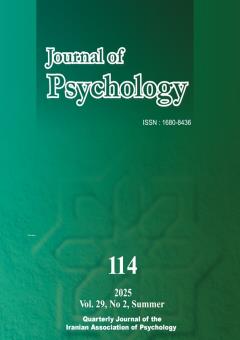The structural relations of self-efficacy and perfectionism with obsessive-compulsive symptoms in nonclinical population: mediator role of cognitive emotion regulation strategies
Subject Areas : روانشناسیTokta Shafiee 1 , Jafar Hasani 2 , Mohamad Shakeri 3
1 - Islamic Azad University
2 - Department of Clinical Psychology, Faculty of Educational Sciences and Psychology, University of Kharazmi, Thran, Iran.
3 - North Khorasan University of Medical Sciences, Bojnord, Iran
Keywords: Cognitive emotion regulation, Self-efficacy, Perfectionism, Obsessive- compulsive symptoms,
Abstract :
The purpose of this study was to investigate the direct and indirect effects of self-efficacy and perfectionism on obsessive - compulsive symptoms in nonclinical population by emphasizing the mediating role of cognitive emotion regulation strategies.From the adults of 20 to 40 years old of Tehran, 473 adults voluntary selected and assessed by obsessive compulsive questionnaire, cognitive emotion regulation strategies questionnaire, perfectionism questionnaire and self - efficacy questionnaire. In order to analyze the data, path analysis method in AMOS- 24 software was used.The results showed that self-efficacy and adaptive cognitive emotion regulation strategies had a negative effect on obsessive-compulsive symptoms while effect of perfectionism and maladaptive emotion regulation strategies on obsessive - compulsive disorder was positive. Also, adaptive cognitive emotion regulation strategies mediated the relationship of self - efficacy and perfectionism with obsessive compulsive symptoms. However, maladaptive cognitive emotion regulation strategies mediated only the relationship of self-efficacy with obsessive - compulsive disorder. Therefore, it can be argued that self-efficacy, perfectionism and emotion regulation constructs play a fundamental role in explaining obsessive - compulsive symptoms and even designing preventive and therapeutic interventions.
